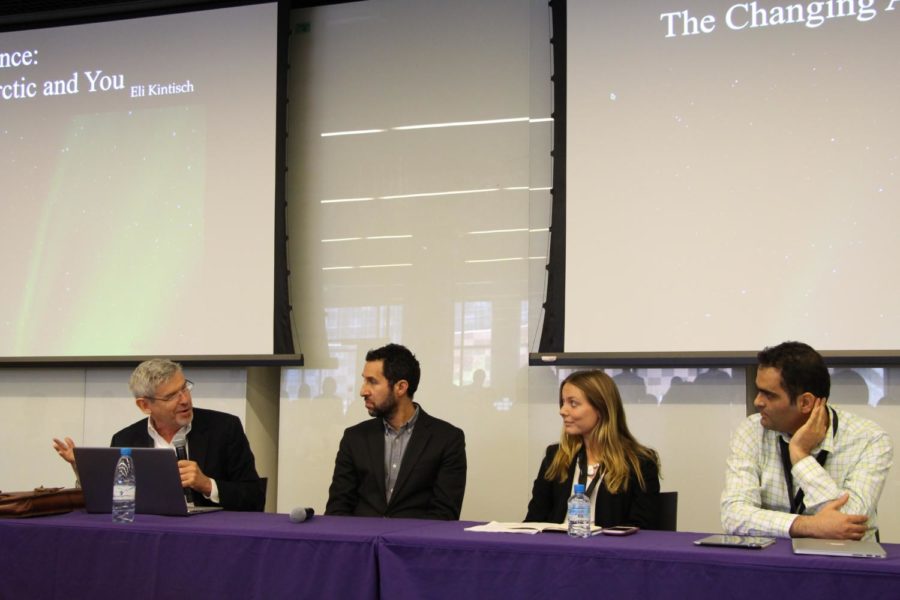Pulitzer Center journalists discuss global effects of climate change
Parts of the Middle Eastern region could be uninhabitable by the end of the century because of global warming, according to a study cited by Tom Hundley, senior editor at the Pulitzer Center on Crisis Reporting, who introduced a panel of journalists at Northwestern University in Qatar on Monday, Oct. 9.
The three journalists spoke about their recent reporting projects on climate change and how the issue affects populations around the globe.
Eli Kintisch, a panelist and contributing correspondent for Science Magazine, spoke about his experience reporting in the Arctic.
The Arctic has been warming up by two degrees over the past decade, which is twice the rate of the rest of the world, Kintisch explained.
“These are some of the demons that face us as 21st century climate change progresses,” said Kintisch.
He said he was worried that he may never have the opportunity to visit the exact same location in the Arctic again due to its melting icecaps. But, there is a chance to prevent this constant climate change by learning more about it, Kintisch added.
Janice Cantieri, a panelist who is a recent Northwestern University Medill School of Journalism graduate as well as a former Pulitzer Center student fellow, spoke about reporting on climate change in Kiribati, a lowland island that is only two meters above sea level in the Central Pacific.
“When I told my friends [that] I was leaving to live on a pacific island, they thought that I would be staying at a fancy resort and swimming all day,” said Cantieri.
In reality, rising sea levels have caused flooding on the island, resulting in Kiribati’s population losing access to clean drinking water and facing a decline in the farming industry, she said. This has created health problems, such as diabetes, she explained.
Such changes are caused primarily by developed countries’ excessive consumption of fossil fuels, she explained. Cantieri suggested measures to reduce our own carbon footprints, such as decreasing use of personal transportation.
Cantieri also recounted how the Kiribati people are trying to adapt to such changes, such as by growing mangroves to avoid flooding and building sea-walls to try to stop the erosion of the shoreline.
Climate change is a global problem but we feel disconnected from the issue because our lifestyles haven’t been directly affected by it, Cantieri said.
Ako Salemi, a panelist and an Iranian photojournalist whose work has appeared in The New Yorker and Time Magazine, shared a photo series he created that visualizes the effects of climate change on Iran. These include drying rivers, increasing temperatures, and several droughts, according to Salemi.
Urmia Lake, one of the biggest salt lakes in Iran, has dried up by around 90 percent in the last 20 years, he said. Droughts have led the fishing industry to decline and consequently fisherman to be unemployed, he added. Temperature increases are also going to affect the habitability of areas in Iran, he said.
Students who attended the talk said they learned more about climate change’s effects on our planet as well as the importance of science reporting.
“I think that having Cantieri was a good way to show us, students, that we can start working on projects, like the [Pulitzer Center student] fellowship programs,” said Fareehan Elgakhlab, a journalism sophomore at NU-Q.
“The presentation was illuminating because I did not care that much about climate change [before],” said Malek Al Manaa, a journalism sophomore at NU-Q. “It also makes you wonder what kind of responsibilities you have as an individual.”













